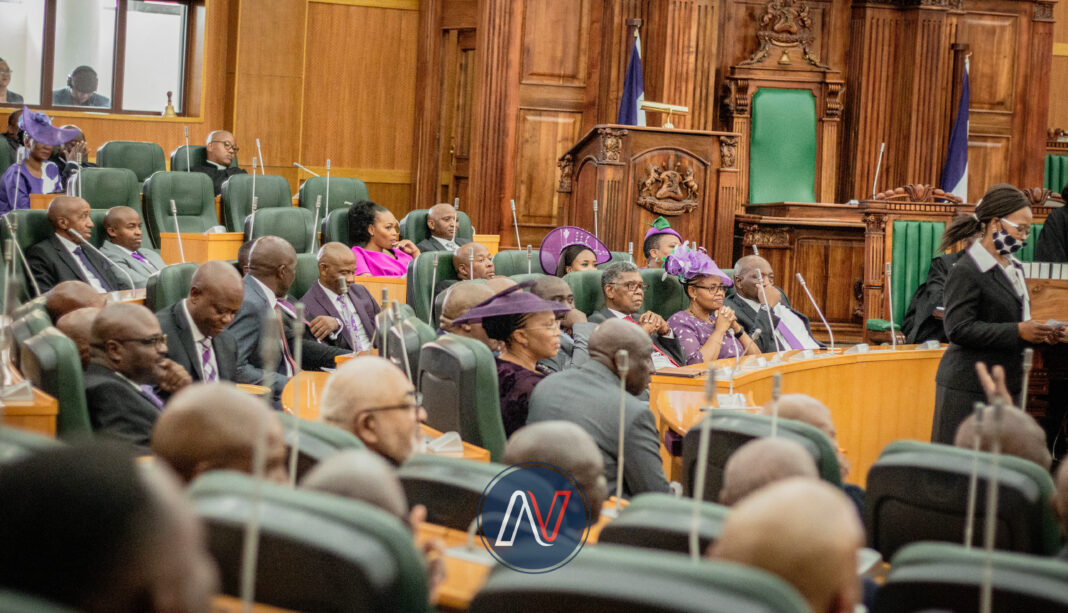Mohloai Mpesi
After barely six months in parliament, Members of Parliament (MPs) could find themselves in a quandary similar to that of their predecessors.
In May last year, the parliament was under intense political pressure.
This was because all the major parties in parliament had just signed a pledge to pass the 10th Amendment to the Constitution Bill 2022, commonly known as the Omnibus Bill, by the end of June 2022.
This was to ensure the bill could go through both houses of parliament, the National Assembly and the Senate, before the expiry of parliament’s term in July.
There were huge concerns about whether the parliament would be able to achieve this. It failed.
Now there are indications that the parliament will not take its winter break if does not pass the Omnibus Bill.
The political leaders reportedly made another commitment in May this year, that is last month.
On Wednesday this week, the European Union (EU) head of delegation, Paola Amadei, said that a decision reached between the government and different stakeholders including civil society is that the passing of the bill as soon as possible is very important.
“We are confident that both the government and the opposition will be responsible and adopt the reforms as soon as possible as it is expected by the voters,†Amadei said.
She said the EU delegation understood that this was part of the multi-stakeholder discussion involving political leaders and members of civil society, among others.
She also indicated that a way forward had been agreed.
“You might have also heard that the tabling of the Omnibus Bill is imminent. We understand that one of the issues that have been discussed is linked to the modality of the tabling of the bill taking into account that the clauses in the Omnibus Bill require different majority and different mechanisms,†she said.
“One positive communication we had during the dialogue, is the intention either to postpone the winter recess of parliament or to call back parliament from the winter recess to allow the adoption of the reforms as soon as possible.
“That is even if we do not have a precise timeline as to when the reforms will be adopted, but at least this is an indication that there is a commitment of the party representatives in parliament and the authorities of the National Assembly and the Senate to do the utmost to complete the process as soon as possible,†she added.
The Omnibus Bill seeks to amend key provisions regarding political parties, floor-crossing in Parliament, the appointment of senior officials, and the role of the prime minister.
Earlier last month, Prime Minister Sam Matekane assured the MPs of the government’s commitment to the national reform process and vowed that his administration would work with all stakeholders to ensure the reforms’ full implementation.
“Lesotho has had a history of instability, tensions, and hatred for a long time and we are as a result, the laughing stock of other countries. We have tarnished our image,†he said to MPs.
“Today God has given us a chance to rescue this country. I have confidence that if we can hold each other’s hands and work together, we will bring Basotho lasting peace,†he added.
Matekane said Lesotho was a nation founded on peace and unity.
“Our great founder King Moshoeshoe I built Lesotho on a foundation of consensus, peace, and diplomacy. Today’s platform affords us an opportunity to look back and exemplify brotherly and sisterly love and respect as we forge meaningful cooperation among ourselves for the benefit of Basotho,†he said.
Amadei on Wednesday said the EU was worried by the slow progress in implementing the reforms.
“We have said it already publicly and we are observing that all parties – the government and the opposition – there is a commitment to adopt the reforms but at the same time we are concerned with the pace of the process,†she said.
EU’s concern dovetails neatly with that of the Lesotho Chapter of the Media Institute of Southern Africa (MISA Lesotho).
During the commemoration of World Press Freedom Day on May 3 this year, MISA Lesotho chairperson, Kananelo Boloetse, said Matekane and his coalition partners committed to prioritising the reforms.
“…however, over six months since the new government was installed, work in earnest to implement the reforms is yet to begin. While we understand that Prime Minister Matekane’s government faces a shopping list of problems, we call on it to prioritise reforms as it promised and take meaningful steps to resuscitate the reform process,†Boloetse said.
“The government should devote resources and political will to make sure that the reforms happen as soon as possible. It should also work in good heart with all the partners feeling productively engaged and involved, and taken seriously,†he added.
He implored all the media houses in the country to consistently keep reminding the political leaders that “Basotho cannot afford to wait any longer for the reformsâ€.
On Wednesday, Amadei said the EU was still convinced that the reforms were the best option for Lesotho to move on the part of prosperity and stability.
Since gaining independence from Britain in 1966, political instability and slow economic development have plagued Lesotho.
The country’s recent political history has been littered with fractious governing coalitions and the proliferation of political parties.
Addressing the question of political and security instability in Lesotho has been on the agenda of the government for the past eight years or so.
This has been so after a recognition that Lesotho was by all indicators regressing as a result of never-ending instability, while its counterparts moved on.
The reforms – meant to usher in a new era of stability in Lesotho – are the result of years of discussions among political parties, civil society, and other role players, mediated by the Southern African Development Community (SADC).
Last year after the previous parliament failed to pass the Omnibus Bill, and following pressure from several quarters, the council of state advised then-prime minister Dr Moeketsi Majoro to declare a state of emergency – one of two conditions under which a dissolved parliament can be recalled.
When he declared a state of emergency, Majoro said failure to pass the bill meant the continuation of unchecked politicization of the public service, including the security agencies, loopholes in the constitution, formation of coalition governments, unregulated floor crossing in parliament, and inadequate regulation of political parties.
He said these issues had been identified as factors undermining political stability, justice, and peace in the country. He further indicated that the current political climate posed a substantial threat, risk, and danger to the country’s stability and prosperity.
“Unless the stated undesirable condition is addressed, it is likely to be beyond the control and escalate thus causing more threat to the peace, safety, and stability of the Basotho nation,†Majoro said.
After the state of emergency was declared, His Majesty King Letsie III recalled parliament to pass the omnibus bill and the National Assembly Electoral Act Amendment Bill 2022.
The two bills and many other bills were consequently passed but on September 12, the High Court (sitting as the Constitutional Court) concluded that the state of emergency, as well as the reconvening of parliament, were null and void.
All laws passed by the recalled parliament were also declared null and void.
Chief Justice Sakoane Sakoane, as well as two judges of the high court, Justice TÅ¡eliso Monapathi and Justice Mafelile Ralebese, presided over the case.
Majoro and the attorney general, advocate Rapelang Motsieloa, appealed the high court ruling but the court of appeal on September 19 last year, dismissed their appeal with costs.
Political parties that were contesting the national assembly elections held on October 7 last year vowed to ensure the reform process would go ahead if they came to power.
During his inauguration in October last year, Matekane said the importance of expediting ongoing national reforms could not be over-emphasised.
“I thank you, your Excellency President Ramaphosa (Cyril) and your right-hand man – the leader of the mediation team Justice Dikgang Moseneke for your commendable efforts in leading and guiding our national dialogue and reform agenda,†he said.
“I promise to expedite the successful completion of the national agenda a journey towards the Lesotho we want,†he added.
He is yet to walk the talk.
Asked why the European Union had become less vocal about the reforms compared to the time before the elections, Amadei this week said that the reforms would have played a significant part by binding the incoming government in some areas such as the recruitment of senior officers.
“Before the elections, we felt there was a window of opportunities for the reforms to be adopted, there was a specific commitment by the tenth parliament to complete the process before the elections, and by adopting the reforms before the elections it would have meant also that the new government would have been bound by those new clauses,†she said.
Summary
- We understand that one of the issues that have been discussed is linked to the modality of the tabling of the bill taking into account that the clauses in the Omnibus Bill require different majority and different mechanisms,†she said.
- “That is even if we do not have a precise timeline as to when the reforms will be adopted, but at least this is an indication that there is a commitment of the party representatives in parliament and the authorities of the National Assembly and the Senate to do the utmost to complete the process as soon as possible,†she added.
- “We have said it already publicly and we are observing that all parties – the government and the opposition – there is a commitment to adopt the reforms but at the same time we are concerned with the pace of the process,†she said.

Your Trusted Source for News and Insights in Lesotho!
At Newsday Media, we are passionate about delivering accurate, timely, and engaging news and multimedia content to our diverse audience. Founded with the vision of revolutionizing the media landscape in Lesotho, we have grown into a leading hybrid media company that blends traditional journalism with innovative digital platforms.








